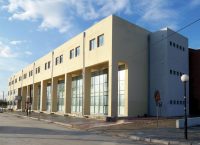
The Department of Planning and Regional Development, of the School of Engineering, is located near the centre of the city of Volos – a modern, lively, medium-sized city with a population of 120.000 inhabitants. Volos is at an approximately equal distance from the country’s two main urban centres Athens and Thessaloniki. The city is located at the foot of Mt. Pelion, a mountain of exceptional natural beauty. With many well-preserved traditional villages, it is a combination of outstanding landscapes for winter and summer tourism. The refreshing natural environment and culture are of great importance for the development of a fast growing academic community in Volos.
The history of the Volos area goes back to prehistoric times. The first prehistoric human settlements in Europe were found in the neighbouring towns of Dimini and Sesklo. Northeast of the city is the town of Iolkos which is associated with the legends of the Expedition of the Argonauts and Homer’s epics. In this century, Volos has made a name for itself as an industrial and commercial centre in central Greece, with the third largest port in the country. In the 1950s, a major earthquake destroyed a large part of Volos including many of the remarkable neo-classical buildings. Today the Municipality of Volos endeavours to preserve and develop new uses for the few remaining industrial or historic buildings. Some of those buildings now house University facilities.
The School of Engineering of the University of Thessaly consists of five departments: the DPRD, Mechanical and Industrial Engineering, Computer Engineering, Telecommunications and Networks, Civil Engineering and Architecture. The offices, classrooms and laboratory facilities are housed at the “Pedion Areos” campus at the city’ s southern entrance. The campus incorporates old industrial buildings which have been restored toge ther with new structures. It is a perfect example of a successful return to new use of the city’s industrial past. The DPRD’s new building is in operation since the beginning of 2000.
ther with new structures. It is a perfect example of a successful return to new use of the city’s industrial past. The DPRD’s new building is in operation since the beginning of 2000.
Pedion Areos, and the surrounding area, is being reshaped. In addition to the new buildings and the outdoor space of the school there is already a large seaside park, which includes a Municipal exhibition centre and an indoor athletic centre. The Krafsidonas stream flows through the campus.
Transportation from the university to the centre of Volos is quick and easy. The campus is a 15 minute walk from downtown. There is also a reliable bus service and easy accessibility for cars. The centre of Volos, where many students live, is a thriving commercial area with a strong cultural community. The Volos Municipal Regional Theatre with one thousand seats and the largest stage in the Balkans, is a continuation of a long theatrical tradition. The Centre of Music Theatre was founded in 1994, in the context of the National Cultural Network of Cities, and organises an annual international meeting of music theatre. The city is famous for its large number of traditional fish taverns. Together with Mt. Pelion it has become an attractive tourist destination.



